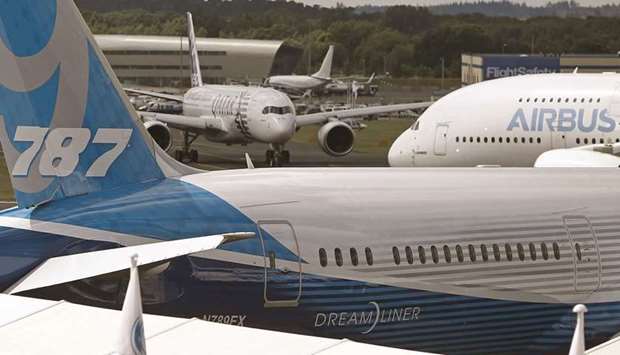Britain and United States agreed yesterday to resolve a long-running trade dispute over Airbus and Boeing and turn their attention to tackling Chinese subsidies, echoing a five-year tariff truce announced by Washington and Brussels.
Together, the matching deals draw a line under 17 years of battles at the World Trade Organisation over aid for the world’s largest plane makers and establish a common front against “non-market” funding, in a reference to China’s rising aerospace sector.
The dispute had triggered a months-long transatlantic tariff war hitting industries such as Scotch whisky until the punitive measures were suspended earlier this year to ease negotiations.
Tariffs will now be set aside for a further five years while governments pledge to provide any funding on market terms, but the two UK-US and EU-US agreements effectively lift uncertainty over a key source of transatlantic trade tensions.
“This will support jobs across the United Kingdom and is great news for Scotch whisky and other exports including aerospace who will no longer face punitive tariffs,” British trade minister Liz Truss said on Twitter.
The Scotch Whisky Association welcomed the deal and said its members had lost £600mn because of US tariffs of up to 25% imposed between October 2019 and March this year.
In the United States, the Distilled Spirits Council said American Whiskey was still being hurt by 25% tariffs in Britain and the EU over a separate dispute on steel and aluminium.
The UK-US aerospace deal came two days after the EU reached a truce with Washington over aircraft subsidies, suspending for five years one set of Trump-era tariffs that had soured relations.
The two sides had been battling since 2004 at the World Trade Organisation over subsidies for US planemaker Boeing and European rival Airbus, which each claimed to have been damaged by unfair competition.
Britain has since left the European Union and yesterday’s almost identically worded agreement achieves many of the same results as the EU-US deal.
Britain, whose ability to negotiate trade deals independently of the EU is central to its new “global Britain” stance, has a long history as one of four core nations involved in Airbus, a relationship that predated its EU membership, and its UK factories make the wings for Airbus commercial jets.
In December, Britain and the United States came close to a standalone aerospace deal that could have forced the hand of Brussels in its own talks with Washington, but drew back amid concerns over UK jobs, Reuters reported.
An official familiar with the talks said it had not been possible at that time to reach a balanced deal.
Airbus, which has 14,000 staff in Britain, has repeatedly warned the UK of the risk that it could shift work abroad, restricting Britain’s ability to negotiate independently over aerospace. The more limited truce agreed this week leaves a disputed system of government loans for Airbus intact but commits Britain, France, Germany and Spain to issue any new loans for Airbus development on market terms still to be defined.
The WTO had ruled that previous government loans to Airbus violated global trade rules, while also ruling against US support to Boeing.
Both sides won partial victories and claimed to have complied with thousands of pages of rulings, but this week’s deals set aside years of legal bickering at the WTO.
Separately, Britain is keen to agree a free trade agreement with the United States, as it seeks new relationships around the world following its exit from the European Union in 2020.

An Airbus A380 aircraft taxis past a Boeing 787-9 Dreamliner before performing in an aerial flying display at the Farnborough International Airshow (file). Britain and the US had been battling since 2004 at the World Trade Organisation over subsidies for US planemaker Boeing and European rival Airbus, which each claimed to have been damaged by unfair competition.
